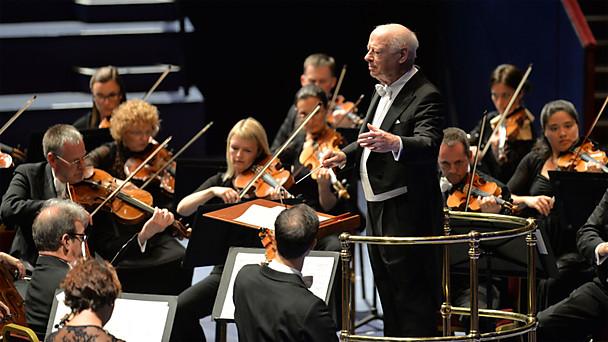You know what to expect from a standard programme of masterpieces like this, led by two great performers in careful control of their repertoire, and those expectations are never going to be disappointed. You’re not going to hear the kind of new-sound Brahms side by side with the more recent end of the German musical tradition – Zimmermann, say, or Henze; that’s the provenance of a fresh thinker like Vladimir Jurowski. But while last night’s kind of old-style concert format may not be with us for ever, we might as well treasure it while it lasts from the likes of Mitsuko Uchida, a pianist who knows how to plant Mozart firmly in this world only to ferry us over to the other side, and Bernard Haitink, at 85 still firmly guiding the London Symphony Orchestra in a powerhouse symphony like Brahms’s Fourth so that everything has its place and every detail tells.
Checking Haitink’s age in a 1988 music dictionary, I found him described even then as “well known for his solid, unspectacular performances of the standard classics”. Well, not much has changed in over a quarter of a century. But there’s a pejorative hint about that definition, and it needn’t be so. It’s true that I momentarily lost focus at the heart of this Brahms Fourth, as I had throughout its two predecessors in Haitink’s previous Brahms cycle (which works a lot better, I think, on the LSO Live CDs that resulted). Occasionally the orchestra’s playing can sound a little dead behind the eyes: where was the strange, archaic atmosphere about the second movement? Where was the real joy in a rhythmically taut scherzo?
Yet in the outer acts of an iron-grip tragedy, Haitink (pictured below with the LSO) can do what very few other conductors in the world achieve without fuss. He makes the opening string sighs instantly take wing; he lifts their big moment of heartease and handles the time-standing-still mystery between development and recap like no other interpreter, just as earlier in Debussy’s Prélude a l’après-midi d’un Faune he made the stomach flip with the subtlest of suspenses in the phrasing. He’s always been a master of an air and suppleness that seem as natural as breathing, and the way he does it is impossible to analyse.
 There are still rigour and energy between the lines, too, and these made his conducting of the Passacaglia the rightful culmination of the evening. The more turbulent variations sweep magnificently but never hurriedly into each other; at the still centre, it’s not just the colour of the trombone harmonies which stuns but the pregnancy of the pauses between them. Haitink always values the space around, and a silence that throbs with unheard sounds.
There are still rigour and energy between the lines, too, and these made his conducting of the Passacaglia the rightful culmination of the evening. The more turbulent variations sweep magnificently but never hurriedly into each other; at the still centre, it’s not just the colour of the trombone harmonies which stuns but the pregnancy of the pauses between them. Haitink always values the space around, and a silence that throbs with unheard sounds.
The LSO string sound in Haitink’s hands is underpinned with smooth, resonant basses, even if it still feels to me a bit like an impersonation of what comes so naturally in Vienna, Berlin and Amsterdam. Yet the woodwind are absolutely peerless. It looked like it was going to be flautist Gareth Davies’s evening, from the faun’s first pipings, feminine and intangible, through to the desolate solo in Brahms’s finale with its human vibrato. But each time oboist Juan Pechan Ramirez followed up with something equally memorable, finding a new solution to Debussy’s brief afternoon chuckles before the final sinking into languor.
And in Mozart’s peerless concerto for piano, wind and orchestra, as we ought to call K482, the clarinets were on a level with Uchida’s fine-tuning, pulling us gently out of the slow movement’s C minor grief and stopping the ethereal hunting-rondo in its tracks with that extraordinary slice-of-heaven minuet, not over-indulged by Haitink. Only he could make the concerto’s opening trumpets and drums sound more than a rococo cliché (such a distinctive sound here from timpanist Nigel Thomas). Uchida as soloist had the trickier task of keeping the first movement real, injecting a sudden snarl with impressive weight and stage-managing to perfection a stunning cadenza flip from modernism to simple essence. From there on, her role was not of this world, always fine-tuned to what her orchestral colleagues, and that woodwind ensemble especially, were up to. It was a very different Mozart partnership from the one with more experimental Robin Ticciati and the LSO last year, but as sure of purpose as you’d expect from two of the composer’s greatest living interpreters.















Add comment